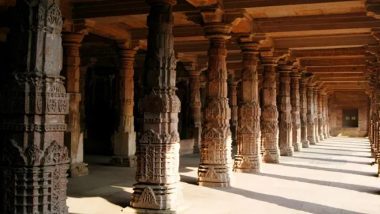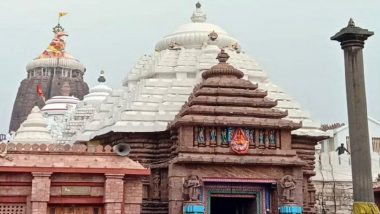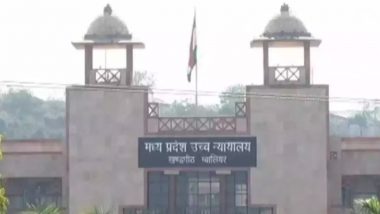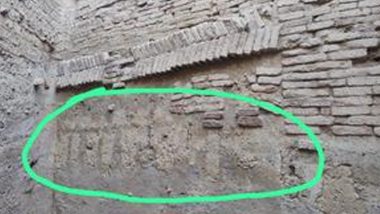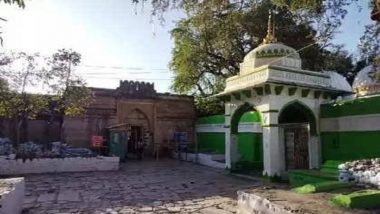New Delhi, April 1: The Supreme Court on Monday refused to stay a "scientific survey" of Bhojshala, a medieval-era structure in Madhya Pradesh's Dhar district which both Hindus and Muslims claim as their own, but said no action should be taken without its permission on the outcome of the exercise.
Hindus consider Bhojshala, an Archaeological Survey of India (ASI)-protected 11th century monument, to be a temple dedicated to Vagdevi (Goddess Saraswati), while the Muslim community calls it Kamal Maula mosque. Madhya Pradesh: ASI Continues Survey at Bhojshala Complex in Dhar for Fourth Day.
Under an arrangement made by the ASI on April 7, 2003, Hindus perform puja on the Bhojshala premises on Tuesdays and Muslims offer 'namaz' in the complex on Fridays. A bench of justices Hrishikesh Roy and P K Mishra issued notices to the Centre, the Madhya Pradesh government, the ASI and others on the plea filed by the Maulana Kamaluddin Welfare Society challenging the March 11 order of the Madhya Pradesh High Court on the "scientific survey".
"Issue notice returnable in four weeks. In the interim, no action should be taken without the leave of this court on the outcome of the ordered impugned survey. "It is made clear that no physical excavation should be taken which will change the character of the premises in question," the bench said. Madhya Pradesh: ASI Begins Survey of Bhojshala Complex in Dhar; Puja, Namaz To Continue As per Practice, Says Official (Watch Video).
In its March 11 order, the high court order had directed the ASI to carry out a "scientific survey" of the Bhojshala complex within six weeks. "A proper documented comprehensively drafted report prepared by an Expert Committee of not less than five (5) senior-most officers of ASI headed by the Director General/Additional Director General of the ASI himself be submitted before this Court within a period of six weeks from the date of receipt of a certified copy of this order," the court said in its 30-page order.
The HC order came on an application filed by an organisation called the Hindu Front for Justice (HFJ). According to the plea, the ASI survey is a statutory duty which should have fulfilled long back at the inspection stage when the "mystery and confusion" about the true character of Bhojshala Saraswati temple (Bhojshala Temple)-cum-Maulana Kamal Maula mosque arose, leading to disputes about its true status.
The plea was moved by HFJ president Ranjana Agnihotri and others against the Union of India and others. The HC will hear the matter next on April 29. Allowing the plea, the HC had issued a number of directions to the ASI, asking it to use the latest methods and techniques for the survey, and had laid down procedures for the entire exercise.
"Complete scientific investigation, survey and excavation, through adoption of latest methods, techniques and modes of GPR-GPS survey of the site in question constituting the disputed Bhojshala temple-cum-Kamal Maula mosque complex, as also the entire 50 m of peripheral ring area surrounding/constituting the circular periphery from the boundary of the complex be conducted," the HC had said.
"A detailed scientific investigation be conducted by adopting carbon dating method for ascertaining the age, life of various structures both above and beneath the ground; permanent, movable and immovable structures both beneath as well as above the ground, constituting the walls, pillars, floors, surfaces, upper top, sanctum sanctorum of the entire complex," it had noted.
The HC suggested giving a representation to the contesting sides in the expert panel tasked with carrying out the scientific investigation, survey and excavation of the site. It had also asked the ASI to prepare an inventory of each and every artefact, idol, deity or any structure found on the premises after unlocking/opening the locked/sealed rooms and halls of the complex and submit the same before it along with their respective photographs.
The HC had allowed the ASI to conduct any other study it deemed necessary to ascertain the true character of the complex and had insisted that submissions relating to the right to worship and performing rituals on the disputed premises shall be considered only after the panel submits its report.





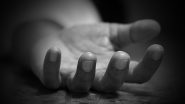







 Quickly
Quickly








